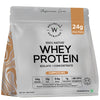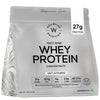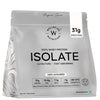For anyone crazy about fitness, there’s often one question that inevitably arises: when to take whey protein for maximum benefits? Is it better to consume a protein shake before or after exercise?
While there are various answers to it, this blog will delve into the science behind whey protein timing, specifically its role in muscle growth, recovery, and energy. Whether you’re looking for optimal muscle gain, improved endurance, or faster recovery, understanding the best timing for whey protein can make a significant difference in your fitness journey.
Understanding Whey Protein
Whey protein is a high-quality protein derived from milk. It contains all nine essential amino acids, which makes it a complete protein. Among these amino acids, branched-chain amino acids (BCAAs), such as leucine, are crucial for muscle protein synthesis. Because whey protein is quickly digested and absorbed by the body, it’s a popular choice for athletes and fitness enthusiasts alike. Before diving into the best time to take whey protein let's have a look at what exactly it does when it's taken before and after workouts.
Whey Protein Before Workouts: Boosting Energy and Performance
Incorporating whey protein into your pre-workout routine can significantly elevate your energy levels and overall performance. Research indicates that consuming protein before exercise plays a crucial role in maintaining muscle mass and preventing muscle breakdown [NIH]. This benefit is particularly important for individuals engaging in high-intensity workouts, where the body's demand for energy surges and the risk of muscle degradation increases.
One of the standout advantages of a whey protein shake before exercising is its ability to provide a steady source of amino acids. This is vital for sustaining energy levels and focus throughout your workout, especially when pushing your limits. The amino acids released into your bloodstream from the protein serve as fuel, helping you power through strenuous exercises and enhancing your stamina.
Moreover, studies have shown that consuming protein before physical activity can lead to reduced muscle damage and improved muscle retention [NIH]. This protective effect is especially pronounced during resistance training, where the muscles undergo significant stress. By preemptively supplying your body with whey protein, you not only shield your muscles from potential damage but also promote faster recovery post-exercise.
Whey Protein After Workouts: Optimizing Muscle Recovery
For many fitness enthusiasts, consuming whey protein after a workout has become a fundamental practice. This habit is rooted in the understanding that post-exercise, the body enters a unique state often referred to as the “anabolic window.” During this period, the muscles become particularly receptive to nutrients, creating an optimal environment for recovery and growth.
After a rigorous workout, your muscles undergo significant breakdown and require immediate support for repair. This is where whey protein plays a vital role. By consuming whey protein following exercise, you effectively replenish your body's amino acid stores, which are essential for muscle repair and rebuilding. Research indicates that ingesting protein post-exercise can markedly enhance muscle protein synthesis, a critical process that accelerates recovery and strengthens muscles [NIH]. This means that by providing your body with the necessary building blocks immediately after your workout, you facilitate a faster return to peak performance.
Additionally, the benefits of whey protein extend beyond muscle repair. A protein shake after exercise can significantly reduce muscle soreness and fatigue, making it easier to bounce back for your next training session. The quicker your muscles recover, the more frequently and intensely you can train, leading to enhanced performance over time. Studies have shown that timely protein intake not only alleviates soreness but also minimizes the duration of recovery, allowing athletes to maintain a consistent and rigorous training schedule [NIH].
Timing is crucial when it comes to maximizing muscle growth and consuming whey protein post-workout is particularly effective. While protein can stimulate muscle protein synthesis at any time, taking it after a workout capitalizes on the body's heightened anabolic state. This strategic timing ensures that your muscles receive the nutrients they need exactly when they need them most, ultimately leading to greater gains in strength and size.
So Which is Better, Pre-Workout or Post-Workout?
When deciding the best time to take whey protein, both pre-and post-workout options offer unique benefits based on your fitness goals. Consuming whey protein after a workout is often recommended for those focusing on muscle growth and reducing soreness. The rapid delivery of amino acids aids in recovery and muscle repair, amplifying the benefits of whey protein after a workout.
Conversely, taking whey protein before a workout can boost energy levels and minimize muscle breakdown, making it an excellent choice for improving endurance. Experts suggest that incorporating both timings can be advantageous, as protein requirements vary depending on workout type and individual needs. A small protein shake before exercise fuels the session, while a larger serving afterward aids in recovery.
Ultimately, whether you choose whey protein before or after workout or both, consistency is key. Regular intake of a high-quality whey protein powder will provide the support needed for optimal performance and recovery, helping you effectively reach your fitness goals.
Choosing the Best Whey Protein Powder
Not all whey protein powders are created equal. Selecting a high-quality whey protein powder ensures that you’re getting a product with a good amino acid profile, minimal additives, and superior absorption. When looking for the Best Whey Protein Powder, consider the following:
Protein Content
Check the label for a high protein content per serving. Generally, high-quality whey protein powders contain around 20-30 grams of protein per serving.
Amino Acid Profile
A whey protein powder rich in BCAAs, particularly leucine, is ideal for muscle growth and recovery.
Absorption Rate
Isolate and hydrolysate whey proteins are absorbed more quickly than concentrate, making them ideal for post-workout consumption.
Ingredient Quality
Look for products with minimal additives and artificial ingredients. High-quality whey protein powders often contain natural sweeteners and fewer fillers.
Conclusion
When deciding between pre- and post-workout whey protein, the focus should be on aligning your choice with your specific fitness goals. If you're looking for an energy boost and enhanced stamina during your workouts, consuming whey protein beforehand can be advantageous. Conversely, to optimize recovery and promote muscle growth after exercise, a protein shake post-workout is ideal.
Ultimately, the key to success lies in consistency. Regular consumption of high-quality whey protein supports muscle maintenance, growth, and overall recovery, helping you achieve your fitness objectives more effectively. Discover what timing works best for you, and let whey protein fuel your fitness journey.
FAQs
1. How does post-workout whey protein help with muscle recovery?
Post-workout whey protein helps with muscle recovery by providing the body with high-quality protein that is quickly absorbed, supplying essential amino acids to repair and rebuild muscle tissue. This helps reduce muscle soreness, accelerate recovery, and stimulate muscle protein synthesis, promoting faster and more effective recovery after intense exercise.
2. How much whey protein should I consume for optimal results?
For optimal results, it's generally recommended to consume around 30-40 grams of whey protein within 30 minutes to an hour after your workout. This amount is sufficient to stimulate muscle protein synthesis and support muscle recovery. Your total daily protein intake should also align with your fitness goals, approx 1 grams of protein per kilogram of body weight for active individuals.
3. What are the best types of whey protein for pre- and post-workout?
Whey protein isolate is often considered the best type for post-workout due to its high protein content and fast absorption rate. It provides the necessary amino acids without excess fat or carbs. For pre-workout, a whey protein concentrate can be a good option as it offers a slower, more sustained release of protein, which can provide energy during your workout while still being effective for recovery.
4. Is whey protein suitable for beginners?
Yes, whey protein is suitable for beginners, especially those who are looking to increase their protein intake to support their fitness goals. It is an easily digestible, high-quality source of protein that helps with muscle growth and recovery, making it a great addition to any beginner's nutrition plan. However, beginners should also focus on getting protein from a variety of whole food sources in addition to supplements.
5. Can I take whey protein before workout?
Yes, you can take whey protein before a workout. Consuming it 30–60 minutes prior can help reduce muscle breakdown and provide a steady supply of amino acids, enhancing endurance and performance during exercise.




























